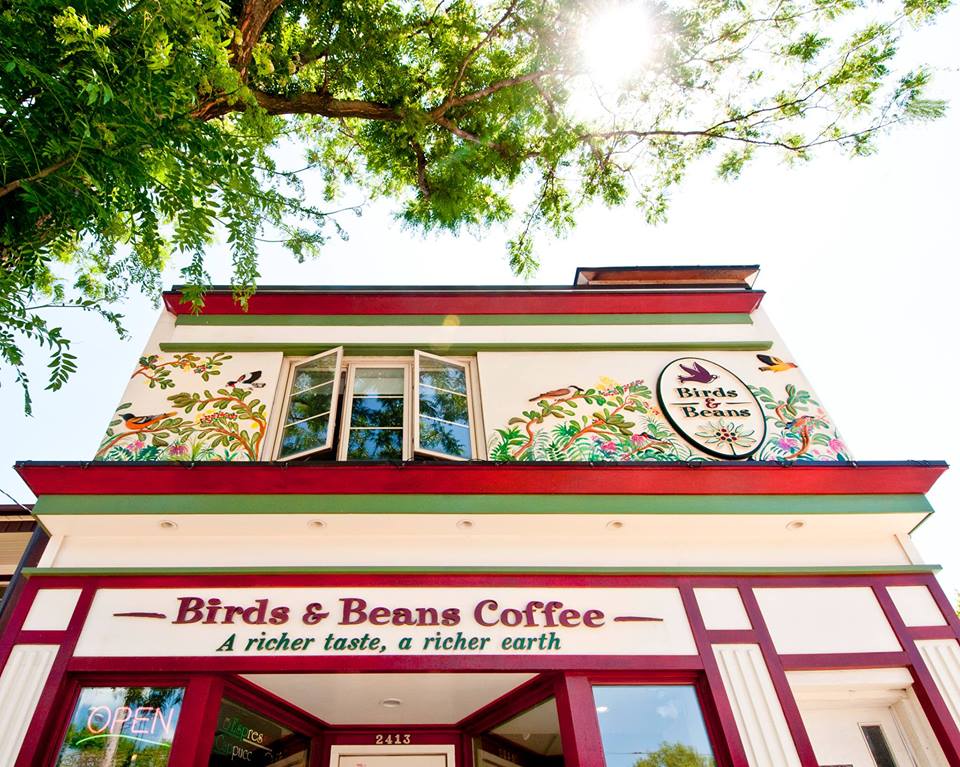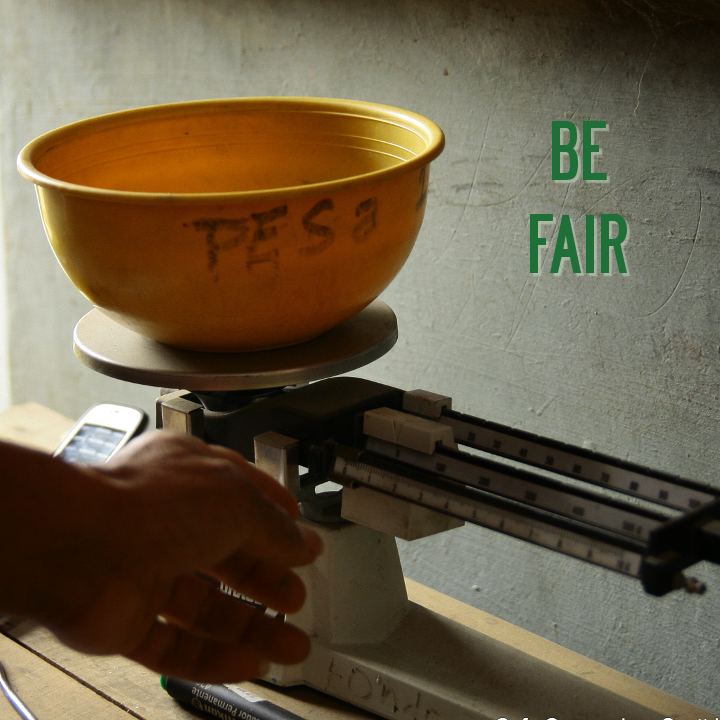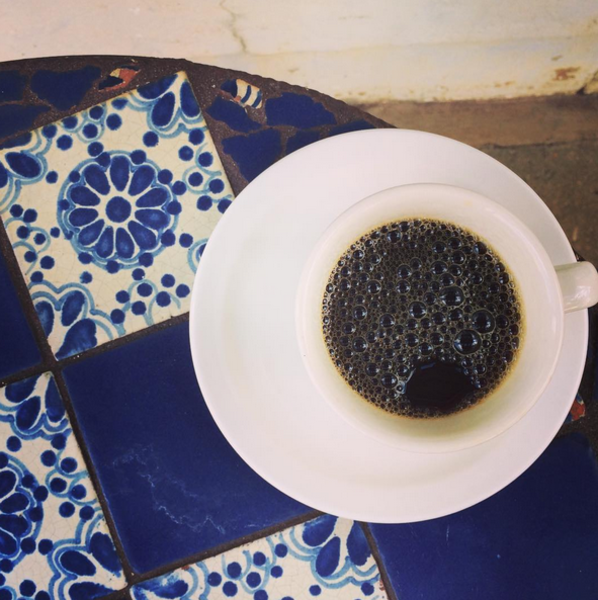9 Conscious Coffee Beans You Have to Try (Plus, Expert Coffee Advice!)

Conscious coffee lovers who also love sustainability: Listen up.
Coffee has always been a reliable drink to turn to when a pick-me-up is needed. Although the way people drink coffee is changing—more millennials tend to venture to their favorite neighborhood coffee shop to get a cup of freshly roasted, organic coffee in the afternoon rather than brew a pot at home in the morning—the dark, hot drink is still popular.
Another thing that’s changed since coffee became the default warm beverage for people on-the-go is that generic, bulk brews don’t make the cut anymore. People crave coffee roasted and brewed by companies that value people, the environment and flavor.
The criteria
All the coffee brands and their roasts featured in this piece were chosen based on the following criteria:
– The brand uses beans from small- to mid-sized farmers. The brand either has a close, fair relationship with farmers, or is designated Fair Trade Certified.
– The brand roasts coffee and uses beans that have a low environmental impact. This means the brand sells organic coffee or is designated with another eco-friendly title, such as Shade-Grown or Certified Bird-Friendly.
– The brand is concerned with quality over quantity; all its coffee types were crafted with care. Basically, the brand has a select line of beans that it sells at a storefront, online or in local stores. Every brand referenced in this list has been lauded by coffee experts and online coffee reviews.
In addition to following the above criteria, we also reached out to coffee experts to get their professional thoughts on how the at-home coffee brewer can pick the best sustainable beans and make the perfect cup.
Are you ready to caff-up?
How to Find Fair Trade + Sustainable + Organic Coffee
Buying USDA Certified Organic coffee, Fair Trade Certified coffee, etc. is about more than taste—it’s also about helping the environment and farmers, too. However, when a brand is able to achieve great tasting roasts while maintaining organic certification, that’s worth noting.
Jason A. Sarley, the associate editor of Coffee Review (@CoffeeReview) and Certified Q-Grader, explains that while most USDA Certified Organic Coffee usually tastes better than conventional coffee, its taste isn’t necessarily interesting.
So, when a USDA Certified Organic Coffee brand can achieve a unique, memorable taste that receives universal high ratings, that’s saying something. See some of the USDA Certified Organic Coffee brands the coffee review has tried by visiting its organic coffee list.
“All of the companies on that list showcase the integrity and dedication necessary to produce world-class coffees; and amazingly, while striving for only the best they continue to support Organic Certification,” he explains.
The majority of coffee brands on the Coffee Review’s list also adhere to our coffee tasting methodology: the brands make sure coffee growers are treated well; coffee is grown and harvested in a way that doesn’t harm the environment; and coffee brewers are concerned with the quality of their roasts.
Kim Elena Ionescu, director of sustainability at the Specialty Coffee Association of America (@SpecialtyCoffee), comes from the school of thought that great coffee is inherently great because it benefits the people and communities involved in creating it while preserving the environment and natural resources.
Ionescu is thankful that more brands are beginning to support coffee that’s grown sustainably—just like the brands on our list. “There is no single correct path toward sustainability, but standards – and measurement against them–are a common feature of coffees that desire to have meaningful and lasting positive impact,” she adds.
We agree.
While all the brands on our list buy coffee from different farmers and places, they all have one thing in common: the beans they use are sustainably derived and are grown and harvested in a positive manner.
Brew the Perfect Cup
Michael Hibbs, a self-made barista who also operates the About Me
” target=”_blank” rel=”noopener noreferrer”>Little Coffee Place (@LCoffeePlace), says if people pay attention to the simple things, the perfect cup of coffee will result.
“The most important factors in order to brew the perfect cup of coffee are freshness, grind, and the coffee to water ratio,” Hibbs says.
Gibbs cautions that all the previously referenced ratios depend on personal preferences and brewing method.
Colby Barr, co-founder of Verve Coffee Roasters (@Vervecoffee), reiterates Hibbs’ comments, and reinforces them with short, simple steps everyone can follow to brew a great pot.
First, use filtered water. Next, grind fresh coffee. Don’t have a coffee grinder? Invest in a Burr Grinder, which grinds uniform particles, resulting in a better tasting brew. Before you begin to brew, make sure your water is hot—as in just-off-boil hot.
“Most home coffee makers simply don’t heat water hot enough, resulting in dull, lackluster, weak tasting coffee,” Barr explains. Also: make sure you’re using the correct coffee ratio: 15:1 water:coffee which is 20g coffee to 300g water for about for a ten-ounce diner mug. And if you use a French Press, let the coffee brew for 4 minutes.
Now, on to the highly-caffeinated but incredibly conscious coffee list…
Coffee Brands that Hit All the Marks

Image via Larry’s Coffee
1. Larry’s Coffee
Larry’s Coffee boasts a great selection of flavorful beans roasted in Raleigh, North Carolina. Larry’s Coffee is:
- USDA Certified Organic
- Certified Fair Trade Proof, Fair Trade Federation, CRS Fair Trade
- Shade-Grown (bird-friendly)
- Kosher
- A member of Cooperative Coffees
- The business is a Certified B Corporation
Larry’s love for coffee started when he was young—not surprising, considering he grew up in Seattle. Although he didn’t intend to become a coffee roaster, his obsession with beans took over when he was in grad school.
For Larry, using fair trade beans was common sense. Not only does keeping everything fair help small farmers, but the search for these unique beans also opened Larry’s eyes to plethora flavors.
When Larry began helping small farmers, he wanted to do more.
“As I learned more about sustainability and climate change, I realized how much building use and energy can make a difference, so we started meeting with engineers and designers about how to lighten our footprint,” Larry adds.
“Step one was cutting open the length of our roasting plant’s roof and installing a massive passive solar clearstory to let sun shine in. Next, we put in super-efficient spray foam insulation and zone heating (to focus just on work areas). Then, we took our administrative offices and installed solar water heating panels and put in a radiant heat floor.”
Taste
We tried Larry’s Bad Kitty Blend. This dark roast was dark… dark, dark. But unlike most dark roasts, Bad Kitty was smooth and silky—very similar to a black cat. One cup of this roast goes a long way and will keep you caffeinated for hours.
Price
The roast we sampled retails for $14.99 for a 12 oz. bag of whole bean coffee. Other roast prices vary.
Where to Buy
Buy this and other roasts online if you aren’t near a store, market or shop that sells Larry’s Coffee.

Image via Birds & Beans Coffee Roasters’Facebook
2. Birds & Beans Coffee Roasters
Birds & Beans hails from Toronto. This coffee roaster’s blends are:
- USDA Certified Organic
- Fair Trade Certified
- Certified Bird-Friendly
While Bird & Beans got its start in Canada, Scott Weidensaul and Bill Wilson launched Birds & Beans coffee in Boston, Massachusetts in 2008.
The company sells beans that meet the rigorous Smithsonian Migratory Bird Center standards. The certification is based on decades of objective scientific research.
Although Birds & Beans’ blends are Fair Trade and Organic, it’s the brand’s namesake Wilson and Weidensaul are most proud of. Bird-friendly coffee means migratory songbirds have a better chance to survive while on their wintering grounds in the tropics, Wilson explains.
Taste
We tried Birds & Beans’ Scarlet Tanager, French Roast. The smell of these divine beans are as magnificent as the coffee’s taste: smoky, dark, and rich.
Price
The roast we sampled was $12.50 for 12 oz. of whole bean coffee. Other blend prices vary.
Where to Buy
Birds & Beans is available throughout the U.S. See all locations here. You also can buy its beans online.

Image via Sweetwater Coffee
3. Sweetwater Organic Coffee
Sweetwater Organic Coffee is located in Gainesville, Florida. Sweetwater’s coffee is:
- USDA Certified Organic
- High altitude and Shade-Grown
- Specialty-Grade Arabica
- Fair Trade Association
- Cooperative Coffees
The brand partners with small-scale farmers and vows to connect with communities while brewing an outstanding cup.
Taste
We tried Sweetwater’s incredibly deep Midnight Oil. This coffee is a dark French roast and it lives up to its name. It sent a shockwave of energy to my brain that lasted well into the evening without any jitters. And while this was one of the darker blends we tried, it still didn’t have a bitter aftertaste—no cream needed.
Price
The sample we tried retails for $12.95 for 1 pound of whole bean coffee. Other blend prices vary.
Where to Buy
Buy at the company’s wholesale facility in Florida, or online.

Image via Dean’s Beans
4. Dean’s Beans
Dean’s Beans Organic Coffee Company was founded in 1993. The Orange, Massachusetts, brand features coffee that’s:
- USDA Certified Organic
- CRS Fair Trade
- SVK Kosher
- Fair Trade Federation Member
Since the company’s opening, it has used high-quality specialty coffee as a vehicle for progressive change throughout Asia, Africa, and the Americas.
Dean, the namesake of the coffee company, began his career as an indigenous rights lawyer, but eventually transitioned to working full-time in the coffee industry.
Through the years, Dean has met the farmers who produce the company’s coffee. He also strives to develop relationships with cooperative members.
Taste
We had a chance to sample Dean’s Beans’ Sumatran French Roast. It was very mild—but still smoky. It’s incredibly easy to drink alone, or paired with a meal. (Cake is a meal, right?)
Price
This blend is priced at $9.69 for 1 pound of whole bean coffee. Other roast prices vary.
Where to Buy
Locals can buy the coffee fresh at its storefront. Everyone else can buy online.

Image via B&B’s Instagram
5. Batdorf & Bronson Coffee Roasters
Batdorf & Bronson was started by Dick Batdorf and Shannon Bronson. It roasts coffee that’s:
- Certified Organic
- Fair Trade Certified
- Bird-Friendly
- Shade-Grown
The company opened in 1986 and was one of the first small batch specialty coffee roasters in the Pacific Northwest. The company has a location in Olympia, Washington, and Atlanta.
B&B is an original champion of Sustainable Harvest, and the brand creates direct trade relationships with farmers; it’s founders have always felt that observing sustainable practices from seed to cup are the right way to do business, Joshua Russert, Northwest outreach and customer support coordinator at Batdorf & Bronson, explains.
Taste
We had some of this brand’s Whirling Dervish blend. This roast was light, but complex. A true treat.
Price
The blend we sampled was $14 for 12 oz. of whole bean coffee.
Where to Buy
Buy online or at one of the company’s locations.

Image via Cafe Man’s Facebook
6. Cafe Mam
Cafe Mam’s blends are grown by native Mayan farmers who live in the highlands of Chiapas, Mexico, in fair trade cooperatives. The 25-year-old company’s growers are from the Mam, Tzetzal, and Mochó peoples. The brand’s coffee is:
- USDA Certified Organic
- Fair Trade Certified
- OTCO
- Green America Approved Business
- Shade-Grown
The coffee growers’ fair trade cooperatives are organized according to egalitarian democratic ideals. These ideals emphasize hard work, responsibility to the cooperative, and high standards.
“[We] believe organic and ethically sourced products, like coffee, shouldn’t be a specialty item, but instead, the defining standard—the new conventional, available and affordable to the average consumer,” Wesley J. Curtis of Cafe Mam says.
Taste
We had Cafe Mam’s Mocho Blend. It finishes crisp and clean, but tastes incredibly rich.
Price
A 1.5 pound, whole bean bag of the roast we sampled is $14.25. Other roasts vary.
Where to Buy
Buy online or visit its store locator.

Image via Rise Up, Luke Wright
7. Rise Up Coffee
Timothy Cureton, founder and CEO of Rise Up Coffee, has operated the business as an independent, small-batch coffee roaster and retailer since March 2005. This brand has coffee that’s:
- Fair Trade Certified
- 100-Percent Organic, Fair Trade
- USDA Organic
All of Rise Up’s coffees are grown on farms using traditional cultivating techniques without the use of pesticides. Cureton attributes the company’s success to its coffee farmers. The brand strives to make certain to honor Fair Trade practices to ensure the people it works with earn a fair wage.
Taste
Rise Up Coffee sent us some of its Organic Costa Rica Las Lajas blend. Its flavor profile includes honey, which the drinker can subtly detect.
Price
This blend retails for $18 for 12 oz. of whole coffee.
Where to Buy
Buy online or at any of the brand’s listed locations.

Image via Kickapoo, Lissy Matthews of Kickapoo Coffee
8. Kickapoo Coffee Roasters
Kickapoo Coffee has served up organic, conscious coffee for ten years. It’s roasts are:
- Fair Trade
- The brand is part of Cooperative Coffees
- MOSA Certified Organic
T.J. Semanchin co-founded Kickapoo Coffee with Caleb Nicholes in 2005. The founders work to keep social justice in mind while roasting a high-quality product.
“The benefit of organic is clear,” Semanchin says.
Everything from the environment to the coffee farmers and workers benefit from the organic growing and harvesting process.
“[We have a] commitment to small farmers who have inherited a colonial history… that dynamic is real in today’s world—that legacy of inequality and dynamic has left many of those regions impoverished,” he adds.
“We address that by making a commitment to the small producers to reduce that trend in the trade”
Taste
We sampled some of Kickapoo Coffee’s organic Guatemala Rio Azul brew. It has a subtle sweet flavor that’s smoky in nature. Related: This roast received a 92 from Coffee Review.
Price
The blend we tried is $15.95 for 12 oz. of whole bean coffee.
Where to Buy
You can buy this brand online, or visit its location for scheduled cuppings.

Image via the Cafe Campesino
9. Cafe Campesino
This Georgia coffee company has coffee that’s:
- Fair Trade Proof
- USDA Certified Organic
The company opened in 1998 after Bill Harris, co-founder, traveled to Guatemala in 1997. His trip educated him on the importance of fair coffee farming. Since the brand’s start, Lee Harris, co-founder, and Tripp Pomeroy have joined the company with the hope of making the best, most sustainable coffee Americus, Georgia, has to offer. The company also is part of the Fair Trade Federation, Georgia Organics, Oregon Tilth, a Certified Green Business, and part of Cooperative Coffees—it was one of the founding members.
Taste
We brewed some of Cafe Campesino’s Easygoing Espresso. This brew lives up to its name: it’s incredibly mild for a darker roast and easy to drink.
Price
The roast we tried was $12.95 for 1 pound of whole bean coffee.
Where to Buy
Buy online or visit its storefront.
If you want to discover more fair trade coffee brands, check out Barnraiser’s collection.
Related on Organic Authority
How to Make Cold Brew Coffee (Plus Secret Ingredients You Need to Try)
3 Coffee Smoothie Recipes: Bring Some Bulk to Your Morning Buzz
The Sirt Food Diet: Activate Your ‘Skinny Gene’ with Chocolate, Kale, and Coffee!
Image of coffee via Shutterstock

